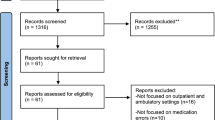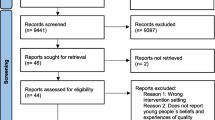Abstract
Addiction treatment agencies typically do not prioritize data collection, management, and analysis, and these agencies may have barriers to integrating data in agency quality improvement. This article describes qualitative findings from an intervention designed to teach 23 addiction treatment agencies how to make data-driven decisions to improve client access to and retention in care. Agencies demonstrated success adopting process improvement and data-driven strategies to make improvements in care. Barriers to adding a process improvement and data-driven focus to care included a lack of a data-based decision making culture, lack of expertise and other resources, treatment system complexity, and resistance. Factors related to the successful adoption of process-focused data include agency leadership valuing data and providing resources, staff training on data collection and use, sharing of change results, and success in making data-driven decisions.
Similar content being viewed by others
References
McLellan AT, Carise D, Kleber HD. The national addiction treatment infrastructure: Can it support the public’s demand for quality care? Journal of Substance Abuse Treatment. 2003;25:117–121.
Ogborne AC, Braun K, Rush BR. Developing an integrated information system for specialized addiction treatment agencies. Journal of Behavioral Health Services & Research. 1998;25(1):100–108.
Camp JM, Krakow M, McCarty D, et al. Substance abuse treatment management information systems: Balancing federal, state, and service provider needs. Journal of Mental Health Administration. 1992;19:5–19.
Institute of Medicine. Crossing the Quality Chasm: A New Health System for the 21st Century. Washington, DC: National Academy Press; 2001.
Institute of Medicine. Improving the Quality of Health Care for Mental and Substance-use Conditions. Washington, DC: National Academy Press; 2006.
Essock SM, Goldman, HH, Van Tosh L, et al. Evidence-based practices: setting the context and responding to concerns. Psychiatric Clinics of North America. 2003;26(4):919–38.
Knights D, Murray F. Politics and pain in managing information technology: A case study from insurance. Organization Studies. 1992;13(2):211–228.
Gustafson DH, Schoofs Hundt A. Findings of innovation research applied to quality management principles for health care. Health Care Management. 1995;20(2):16–33.
Capoccia V, Cotter F, Gustafson D, et al. (in press). Making Stone Soup: How Process Improvement Is Changing the Addiction Treatment Field. Joint Commission Journal on Quality and Patient Safety.
Langley GJ, Nolan KM, Nolan TW, et al. The Improvement Guide: A Practical Approach to Enhancing Organizational Performance. San Francisco, CA: Jossey-Bass Publishers; 1996.
McCarty D, Gustafson DH, Wisdom JP, et al. (in press). The Network for the Improvement of Addiction Treatment: Strategies to enhance access and retention. Drug and Alcohol Dependence.
Boyzatis RE. Transforming Qualitative Information: Thematic Analysis and Code Development. Thousand Oaks, CA: Sage, 1998.
Garnick DW, Lee MT, Chalk M, et al. Establishing the feasibility of performance measures for alcohol and other drugs. Journal of Substance Abuse Treatment. 2002;23(4):375–85.
McCorry F, Garnick D, Bartlett J, et al. Developing performance measures for alcohol and other drug services in managed care plans. Joint Commission Journal on Quality Improvement. 2000;26(11):633–43.
Dick RS, Steen EB. The Computer-Based Patient Record: An Essential Technology for Health Care. Washington, DC: National Academy Press; 1991.
Anderson JG. Clearing the way for physicians’ use of clinical information systems. Communications of the Association for Computing Machinery. 1997;40(8):83–90.
Lapointe L, Rivard S. Getting physicians to accept new information technology: insights from case studies. Canadian Medical Association Journal. 2006;174(11):1573–1578.
National Board for Certified Counselors and Affiliates. National Counselor Examination for Licensure and Certification. No date. Available at: http://www.nbcc.org/ncestats. Accessed March 7, 2006.
Burlton RT. Business Process Management. Indianapolis, IN: Sams Publishing; 2001.
Acknowledgments
The Network for the Improvement of Addiction Treatment (NIATx) was supported through grants from the Robert Wood Johnson Foundation and the Substance Abuse and Mental Health Services Administration, Center for Substance Abuse Treatment. Evaluation activities were supported through awards from the Robert Wood Johnson Foundation (46876 and 50165), the Center for Substance Abuse Treatment (through a subcontract from Northrop Grumman Corporation, PIC-STAR-SC-03-044), and the National Institute on Drug Abuse (R01 DA018282). National Program Office activities were supported through awards from the Robert Wood Johnson Foundation (48464), the Center for Substance Abuse Treatment (through a subcontract from Northrop Grumman Corporation, PIC-STAR-SC-04-035).
Portions of this article were presented at Addictions Health Services Research conference, Santa Monica, CA, October, 2005. Mr. Hayes was Director of Quality Assurance at Sinnissippi Centers, Inc., in Dixon, IL, during authorship. The support and contributions of Elaine Cassidy, Luke Bergmann, Jose Valdez, Hsueh-Yi Lu, and Andy Quanbeck are appreciated. We are especially grateful for the participation and support from the 39 member agencies of NIATx.
Author information
Authors and Affiliations
Corresponding author
Rights and permissions
About this article
Cite this article
Wisdom, J.P., Ford II, J.H., Hayes, R.A. et al. Addiction Treatment Agencies’ Use of Data: A Qualitative Assessment. J Behav Health Serv Res 33, 394–407 (2006). https://doi.org/10.1007/s11414-006-9039-x
Published:
Issue Date:
DOI: https://doi.org/10.1007/s11414-006-9039-x




